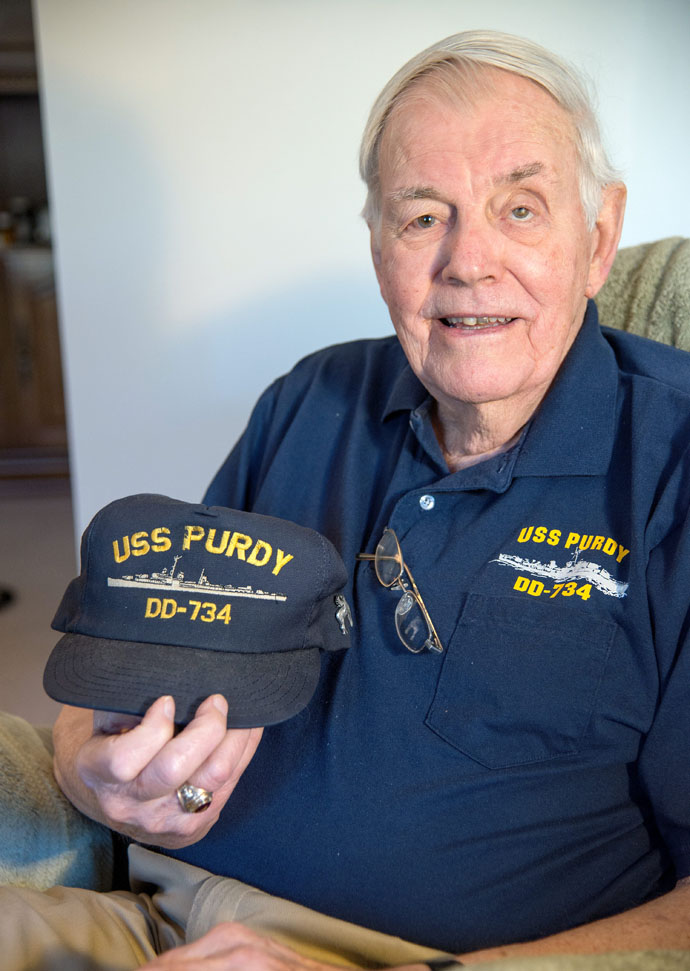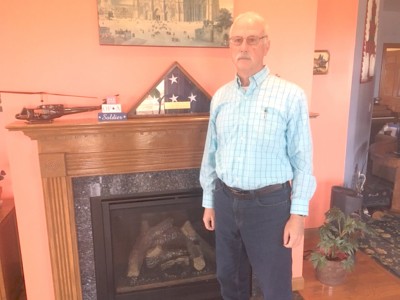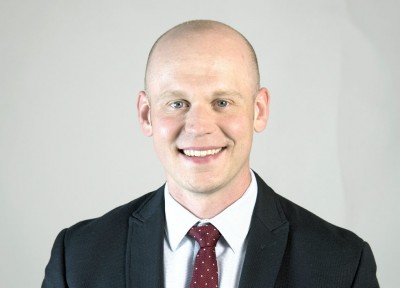Robert Espeseth
By Paul Wood

Photo By Rick Danzl/The News-Gazette
SAVOY — Though he served in the Korean War, Navy Capt. Robert Espeseth’s closest brush with death came in Manila Bay.
Espeseth, a retired University of Illinois professor at 84, was an ensign in the Navy when he was the films officer for the USS Purdy (DD-734), a destroyer that traveled around the world to provide support in the Korean War.
The Purdy was in the Philippines when it fell upon Espeseth to get some movies to entertain the sailors on board.
But there was a typhoon in Manila Bay, and it was a job in itself to find a boat willing to take him out to the destroyer.
“It was a damn good blow,” he says.
The seas were heaving, and at an opportune moment, Espeseth heaved the movie reels into the Purdy’s deck.
Then, when the moment was right, he jumped onto the ship’s lifelines and pulled himself on board.
There were other dangerous duties, to be sure — such as shooting at floating mines to make them explode safely, and intercepting boats along the North Korean coast.
In one memorable mission, the destroyer fired on North Korean trains when they emerged from tunnels from which they’d been hiding, where mountains dipped directly into the sea.
It was pretty amazing stuff for a Wisconsin boy who played football — and switched to crew — at the University of Wisconsin and earned a degree in landscape architecture there, all while serving in the ROTC.
His ROTC commitment sent him into the Navy, where he was on active duty for three years, then 27 years in the Reserves. He left as a captain.
Espeseth worked in parks administration in Wisconsin and Michigan before coming to the UI, where he is a professor emeritus of leisure studies.
He and wife Mary Ann have been here since 1973, the longest they’ve lived anywhere.
They had five children; one daughter still lives in the area.
Early in April, Espeseth went on an Honor Flight through Land of Lincoln Honor Flight.
He and other veterans of World War II, Korea and Vietnam traveled from Abraham Lincoln Capital Airport in Springfield to visit war memorials in Washington on a free day trip.
“It was so well organized that I was truly impressed,” Espeseth said. “They really have it well oiled.”
He had not seen the World War II Memorial at all, and had never seen the Air Force Memorial up close.
The veterans watched the changing of the guard at Arlington National Cemetery.
On their return to Springfield, the group was greeted by bag pipers, guitars and dozens of well-wishers, including Espeseth’s brother’s family from Milwaukee.
“I cried when I saw Mary Ann,” the professor says of his return.
Of the Korean War, he thinks sometimes “it didn’t make a lot of a difference.”
On the other hand, the difference in the lifestyles of those living in the north and south show that if the U.S. and U.N. forces hadn’t been there, South Korea might be a much less fortunate, he says.
Do you know a veteran who could share a story about military service? Contact staff writer Paul Wood at pwood@news-gazette.com.
Read more stories from local veterans:
 Stephen Reinhart
RURAL PESOTUM — Lt. Col. Stephen Reinhart started out No. 1 in the draft lottery but found out he liked the Army so much …
Stephen Reinhart
RURAL PESOTUM — Lt. Col. Stephen Reinhart started out No. 1 in the draft lottery but found out he liked the Army so much …
 Eric Swenson
PAXTON — In Ar-Ramadi, Iraq, as part of the 2007 surge, Eric Swenson was on a base that was attacked three or four times …
Eric Swenson
PAXTON — In Ar-Ramadi, Iraq, as part of the 2007 surge, Eric Swenson was on a base that was attacked three or four times …
 Bon Bui
URBANA — Wounded six times in battle, Major Bon Bui spent 13 years starving in a prison and being “re-educated” in commu …
Bon Bui
URBANA — Wounded six times in battle, Major Bon Bui spent 13 years starving in a prison and being “re-educated” in commu …